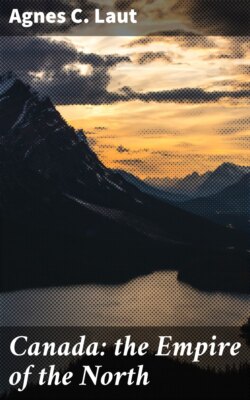Читать книгу Canada: the Empire of the North - Agnes C. Laut - Страница 6
На сайте Литреса книга снята с продажи.
COMPARATIVE STATEMENT OF POPULATION IN CANADA
AND THE UNITED STATES
ОглавлениеTable of Contents
| United States | Canada | |||
| In 1800 | 5,000,000 | In 1881 | 4,300,000 | |
| " 1810 | 7,000,000 | " 1891 | 5,000,000 | |
| " 1820 | 9,600,000 | " 1901 | 5,500,000 | |
| " 1830 | 12,800,000 | " 1906 | 6,500,000 |
It will be noticed that for twenty years Canada's population becomes almost stagnant. The reason for this will be found as the story of Canada is related. If she keeps up the increase at the pace she has now set, or at the rate the United States' population went ahead during the same period of industrial development, the results can be forecast from the following table:
| United States in 1840 | 17,000,000 |
| " " " 1850 | 23,000,000 |
| " " " 1860 | 31,000,000 |
| " " " 1870 | 38,000,000 |
| " " " 1880 | 50,000,000 |
| " " " 1890 | 63,000,000 |
| " " " 1900 | 85,000,000 |
A few years ago, when talking to a leading editor of Canada, I chanced to say that I did not think Canadians had at that time awakened to their future. The editor answered that he was afraid I had contracted the American disease of "bounce" through living in the United States; to which I retorted that if Canadians could catch the same disease and accomplish as much by it in the twentieth century as Americans had in the nineteenth, it would be a good thing for the country. It is wonderful to have witnessed the complete face-about of Canadian public opinion in the short space of six years, this editor shouting as loud as any of his exuberant brethren. Still, as the outlook in Canadian affairs may be regarded as flamboyant, it is worth while quoting the comment of the most critical and conservative newspaper in the world—the London Times. The Times says: "Without doubt the expansion of Canada is the greatest political event in the British Empire to-day. The empire is face to face with development which makes it impossible for indefinite maintenance of the present constitutional arrangements."
Regarding the Iceland immigrants, to whom reference is made, I recently met in London a famed traveler, who was in Iceland when the people were setting out for Canada, Mrs. Alec. Tweedie. She explains in her book how these people were absolutely poverty-stricken when they left Iceland. In fact, the sufferings endured the first year in Winnipeg were mild compared to their privations in Iceland before they sailed.
The explanations of Canada's hard times from Confederation to 1898—say from 1871, when all the provinces had really gone into Confederation, to 1897, when the Yukon boom poured gold into the country—can be figured out. Of a population of 3,000,000, four fifths need not be counted as taxpayers, as they include women, children, clerks, farmers' help, domestic help—classes who pay no taxes but the indirect duty on clothes they wear and food they eat. This practically means that the billion-dollar burden of making the ideal of Confederation into a reality by building railroads and canals was borne by 600,000 people, which means again a large quota per man to the public treasury. People forget that you can't take more out of the public treasury than you put into it, that it is n't like an artesian well, self-supplied, and the truth is, at this period Canadians were paying more into the public treasury than they could afford—more than the investment was bringing them in.
